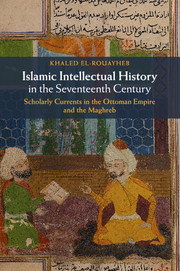Crossref Citations
This Book has been
cited by the following publications. This list is generated based on data provided by Crossref.
Leezenberg, Michiel
2016.
The Vernacular Revolution: Reclaiming Early Modern Grammatical Traditions in the Ottoman Empire.
History of Humanities,
Vol. 1,
Issue. 2,
p.
251.
Hammond, Andrew
2017.
SALAFI THOUGHT IN TURKISH PUBLIC DISCOURSE SINCE 1980.
International Journal of Middle East Studies,
Vol. 49,
Issue. 3,
p.
417.
Subrahmanyam, Sanjay
2017.
Beyond the usual suspects: on intellectual networks in the early modern world.
Global Intellectual History,
Vol. 2,
Issue. 1,
p.
30.
Curry, John J.
2017.
Khaled el-Rouayheb, Islamic Intellectual History in the Seventeenth Century: Scholarly Currents in the Ottoman Empire and the Maghreb.
Osmanlı Araştırmaları,
p.
459.
Warscheid, Ismail
2017.
The Persisting Spectre of Cultural Decline.
Journal of the Economic and Social History of the Orient,
Vol. 60,
Issue. 1-2,
p.
142.
Yılmaz, Yasir
2017.
Nebulous Ottomans vs. Good Old Habsburgs: A Historiographical Comparison.
Austrian History Yearbook,
Vol. 48,
Issue. ,
p.
173.
Young, Walter Edward
2017.
The Dialectical Forge.
Vol. 9,
Issue. ,
p.
19.
Sahin, Abdullah
2017.
The Pedagogy of Compassion at the Heart of Higher Education.
p.
127.
Calderwood, Eric
2017.
Franco's Hajj: Moroccan Pilgrims, Spanish Fascism, and the Unexpected Journeys of Modern Arabic Literature.
PMLA/Publications of the Modern Language Association of America,
Vol. 132,
Issue. 5,
p.
1097.
Reichmuth, Stefan
2017.
Aspects of Prophetic Piety in the Early Modern Period.
Archives de sciences sociales des religions,
Vol. 178,
Issue. ,
p.
129.
Schwartz, Kathryn A.
2017.
Book history, print, and the Middle East.
History Compass,
Vol. 15,
Issue. 12,
YAYCIOGLU, ALI
2018.
Guarding Traditions and Laws—Disciplining Bodies and Souls: Tradition, science, and religion in the age of Ottoman reform.
Modern Asian Studies,
Vol. 52,
Issue. 5,
p.
1542.
Yaycioglu, Ali
2018.
The Wiley Blackwell History of Islam.
p.
433.
Jomier, Augustin
and
Warscheid, Ismail
2018.
Pour une islamologie historienne.
Annales. Histoire, Sciences Sociales,
Vol. 73,
Issue. 2,
p.
311.
El-Rouayheb, Khaled
2018.
Encyclopedia of Renaissance Philosophy.
p.
1.
Graf, Gunhild
2018.
ʿIlm al-kalām in Mauretanien anhand maurischer Kommentare zur Iḍāʾat ad-duǧunna
fī iʿtiqād ahl as-sunna von al-Maqqarī (st. 1041/1632)
.
Asiatische Studien - Études Asiatiques,
Vol. 72,
Issue. 3,
p.
751.
Hathaway, Jane
2018.
The Chief Eunuch of the Ottoman Harem.
Rizvi, Sajjad
2018.
The Wiley Blackwell History of Islam.
p.
393.
Mayeur-Jaouen, Catherine
2018.
« À la poursuite de la réforme »: Renouveaux et débats historiographiques de l’histoire religieuse et intellectuelle de l’islam,xve-xxie siècle.
Annales. Histoire, Sciences Sociales,
Vol. 73,
Issue. 2,
p.
317.
Coullaut Cordero, Jaime
2019.
Vida y obra de un médico morisco en el exilio: Muḥammad b. Aḥmad b. Abī l-‛Āṣ (ss. XVI-XVII).
Al-Qanṭara,
Vol. 40,
Issue. 1,
p.
73.



